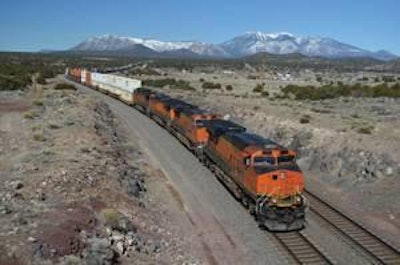
High diesel fuel prices have pushed up the cost of shipping everything, including eggs, and it has increased the cost differential between shipping by truck or rail. McKay TransCold, an Iowa-based shipping company with experience shipping eggs, is working with a Class 1 railroad and a pair of cold storage warehouse partners to develop a service for moving refrigerated perishable food items between California and the Midwest.
Expedited rail service
Jason Spafford, vice president of business development at McKay TransCold, said the rail service will run from a refrigerated warehouse near Joliet, Ill., to a similar warehouse in Bakersfield, Calif., -- a distance of around 2,000 miles. Initially, he said the plan is to run two trains per week with around 30 refrigerated boxcars per train, and the hope is the trains will grow quickly to 50 boxcars each.
The boxcars are what Spafford referred to as “super reefers.” They are 72 feet long and will hold between 3.5 to 4.2 truckloads of product per car. A 50-car train will haul the equivalent of around 200 truckloads of product. The super reefers can be used for frozen or refrigerated shipments and the car temperature can be set according to customer requirements. Spafford said the boxcars have all been refurbished in the last few years and will have shelving or racks built in so that pallets of product can be transported two pallets high without the double stacking of the pallets. He said the boxcars will be washed out after each trip.
Everything from multiple truckloads to less-than-truckload orders will be accepted on the train. Spafford said that the warehouse will be able to receive product from up to six days before shipping to around four hours before the train leaves. Spafford said that the concept is for the boxcars to be full of perishable items both coming and going. Just like with trucking, it doesn’t really work economically to come back from California with an empty train.
There was a time when egg shipments were banned from railroads, according to Spafford. But he said that cases of eggs were tested on equipment that simulates the jostling of a train ride, and they passed. The plan is for the trains to travel around 55 miles per hour, bypassing towns and slower moving trains. Spafford said that a truck with a team of drivers would be able to make the trip faster than the train, but that the train would arrive about the same time as a truck with a single driver.
Cost savings and logistics options
Egg producers could expect a 10-15 percent cost savings on shipping out to California, according to Spafford; this includes shipment to the Midwest hub, transfer to the train, shipment to California, transfer in Bakersfield and shipment to market from Bakersfield. The cold storage warehouse in Bakersfield will have capability to break loads or do other processing the egg producer might require, or the load can be cross docked onto a truck.
Spafford said that egg producers within a 400-mile radius of the Illinois warehouse and egg customers within 400 miles of the Bakersfield warehouse are in the sweet spot for this service.


















